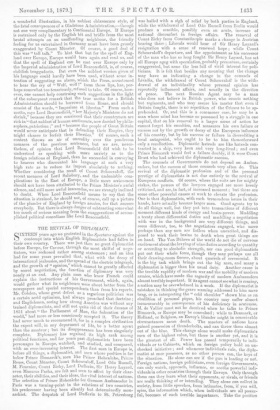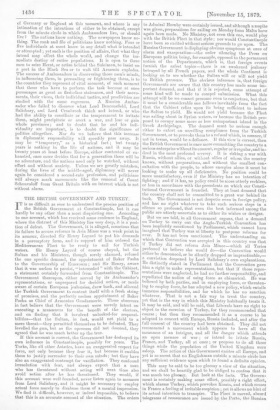THE REVIVAL OF DIPLOMACY.
protested in the Spectator against the SIXTEEN years ago we contempt into which English Diplomatists had fallen in
their own country. There was just then no great diplomatist before Europe, for Cavour, through the most skilful of nego- tiators, was reckoned rather among statesmen ; and an idea had for some years prevailed that, what with the decay of international jealousies, and the spread of the electric telegraph, and the growth of "opinion," which cannot be greatly affected by secret negotiation, thefunction of diplomacy was very nearly at an end. Any plain man who knew French could explain the instructions of his Government, which, again, would gather what its neighbours were about better from the newspapers and special correspondents than from his reports. Mr. Cobden, whose great defect as a sagacious politician was a certain acrid optimism, had always preached that doctrine ; and Englishmen, seeing how strong America was without any trained diplomatists, and still not quite rid of their dreams of 1851 about "the Parliament of Man, the federation of the world," had more or less consciously accepted it. The theory
i
had never much to recommend t, for in a complex civilisation the expert will, in any deparment of life, be a better agent than the amateur ; but its disappearance has been singularly complete. Diplomacy has regained its high rank among political functions, and for years past diplomatists have been personages in Europe, watched, and studied, and compared, with an ever-increasing interest. The Brat man in Europe is, before all things, a diplomatist, and men whose position is far below Prince Bismarck's, men like Prince Hohenlohe, Prince Reuss, Count Minster, Count Schouvaloff, Lord Odo Russell, M. Fournier, Count Zichy, Lord Dufferin, Sir Henry Layard, even Musurus Pacha, are felt and seen to a
i ffect by their char- acter, their abilities, and their ideas, the vital interest of nations. The selection of Prince Hohenlohe for German Ambassador in Paris was a turning-point in the relations of two countries, his predecessor having been silently but determinedly mon- archist. The despatch of Lord Dufferin to St. Petersburg was hailed with a sigh of relief by both parties in England, while the withdrawal of Lord Odo Russell from Berlin would produce a sensible, possibly even an acute, increase of national discomfort in foreign affairs. The removal of Count Zichy from Constantinople marks a change in Austrian bearing there ; Liberals would hear of Sir Henry Layard's resignation with a sense of renewed hope ; while Count Schouvaloff's departure, and the appointment as his successor of the man who has so long fought Sir Henry Layard, has set all Europe agog with speculation, probably premature, certainly exaggerated, but none the less full of vivid interest for poli- ticians. It is felt that besides any meaning that the change may have as indicating a change in the counsels of Livadia, the withdrawal of Count Schouvaleff is the with- drawal of an individuality whose personal opinion has repeatedly influenced affairs, and usually in the direction of peace. The next Russian Agent may be a man who does not believe in British power, who counts nothing but regiments, and who may assure his master that even if Britain fought, there is no repetition of the Crimea to be ap- prehended. Or, and this is a commoner case, he may be a man whose mind has become so possessed by a struggle in one capital, that on his removal to a larger scene of action he cannot forget his enmities, and measures his own failure or success not by the growth or decay of the European influence of his country, but by his success or failure in discrediting a local antagonist, who ought to be to him thenceforward only a recollection. Diplomatic hatreds are like hatreds con- tracted in a ship, very keen and very long-lived ; and even Prince Bismarck would feel a failure doubly, if it were Count Beust who had achieved the diplomatic success.
The counsels of Governments do not depend on Ambas- sadors, but the success of those counsels very often do. This revival of the diplomatic profession and of the personal prestige of diplomatists is not due entirely to the revival of European conflicts. Of course, where the suits are for mighty stakes, the powers of the lawyers engaged are more keenly criticised, and are, in fact, of increased moment ; but there are some other powerful causes at work to elevate the profession. One is that diplomatists, with such tremendous issues in their hands, have actually become larger men. Good agents try to do all things well, but they put into transactions of different moment different kinds of energy and brain-power. Muddling a treaty about differential duties and muddling a negotiation with war in the background are very different things, and seem different, too, to the negotiators engaged, who more perhaps than any men are listless when unexcited, and dis- posed to work their brains to death when great things are on hand. The Von Billows of the world do not die of nervous excitement about the levyingof wine duties according to quantity or according to alcoholic strength, nor can good diplomatists put out their whole force, though they may perhaps use all their drawing-room finesse, about quarrels of ceremonial. It is the big task which brings out the big man, and many a diplomatist is bigger than his usual duty. Another cause is the terrible rapidity of modern war and the mobility of modern armies, which have made the sagacity of modern Ambassadors almost terribly important. If its agent cannot see what is coming, a nation may be overwhelmed in a week. If the diplomatist is mistaken in thinking the grave warning addressed to him mere brag, or in interpreting the " cold shoulder" shown him as an ebullition of personal pique, his country may suffer almott immeasurably in consequence of his deficiency in acuteness. M. de Vallier must not be deceived when he talks to Prince Bismarck, or Europe may be convulsed ; while to Denmark, or Holland, or Belgium, an Envoy's blunder might in conceivable circumstances mean death. The masters of nations have gained possession of thunderbolts, and can throw them almost out of the blue. This change alone would make diplomatists men of the highest value, but there is another yet, and it is the greatest of all. Power has passed temporarily to indi- viduals or to Cabinets, which on foreign policy hold an un- checked initiative ; and whenever individuals rule, the diplo- matist at once possesses, as no other person can, the keys of the situation. He alone can see if the gun is loading or not. Foreign nations, foreign politicians, even foreign Governments, can only watch, approach, influence, or soothe powerful indi- viduals in other countries through their Envoys. Only through them can they learn what their opponents, or rivals, or friends are really thinking of or intending. They alone can collect in society, from little speeches, from intimates, from, if you will, spies, the information which, when individuals are all power- ful, becomes of such terrible importance. Take the position of Germany or England at this moment, and where is any intimation of the intentions of either to be obtained, except from the minute circle in which Ambassadors live, or should live ? The nations know nothing. The newspapers know no- thing. The rank and file of politicians know nothing. Four or five individuals at most know in any detail what is intended or attempted ; yet such is the position of affairs, that what they intend may affect the whole world, and change the im- mediate destiny of entire populations. It is open to three men to seize Herat, or retire behind the Suleiman, to insist on a port in the Black Sea or to wait till Armenia explodes. The success of Ambassadors in discovering those men's minds, in influencing them, in persuading or frightening them, is to the countries they represent of vital moment, of such moment that those who have to perform the task become at once personages as great as first-class statesmen, and their move- ments, their views, their individual tactics, and proclivities are studied with the same eagerness. A Russian Ambas- sador who failed to discover what Lord Beaconsfield, Lord Salisbury, and Lord Cranbrook think and intend, or who had the ability to conciliate or the temperament to irritate them, might precipitate or avert a war, and lose or gain whole provinces ; and to doubt that he and his indi- viduality are important, is to doubt the significance of politics altogether. Nor do we believe that this increase in diplomatic responsibility will speedily pass away. It may be "temporary," as a historical fact ; but twenty years is nothing in the life of nations, and it may be twenty years at least before Europe, either contented or ex- hausted, once more decides that for a generation there will be no adventure, and the nations need only be watched, without effort and without anxiety. Unless we are greatly mistaken, during the lives of the middle-aged, diplomacy will never again be considered a second-rate profession, and politicians will always mark movements like the removal of Count Schouvaloff from Great Britain with an interest which is not without alarm.



































 Previous page
Previous page